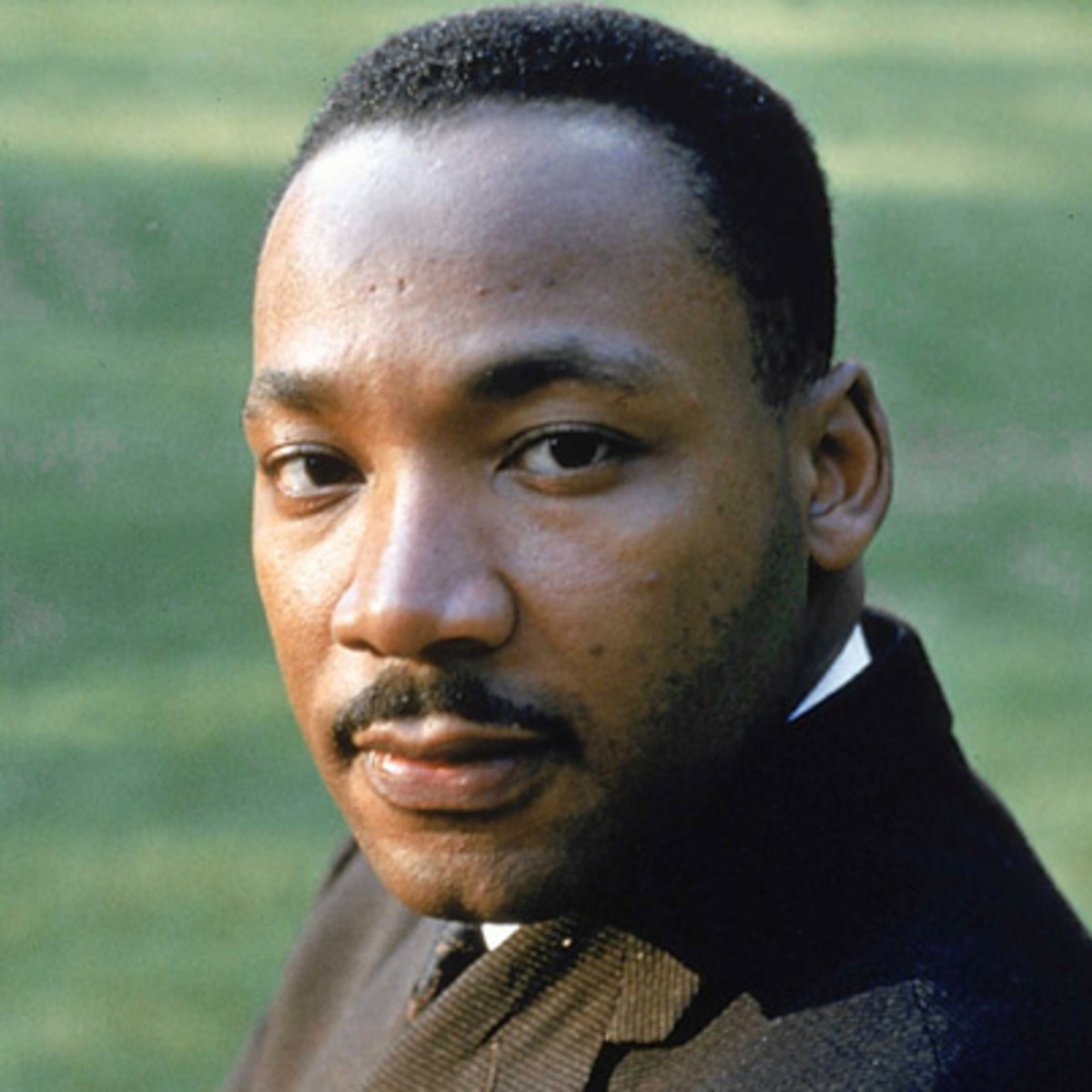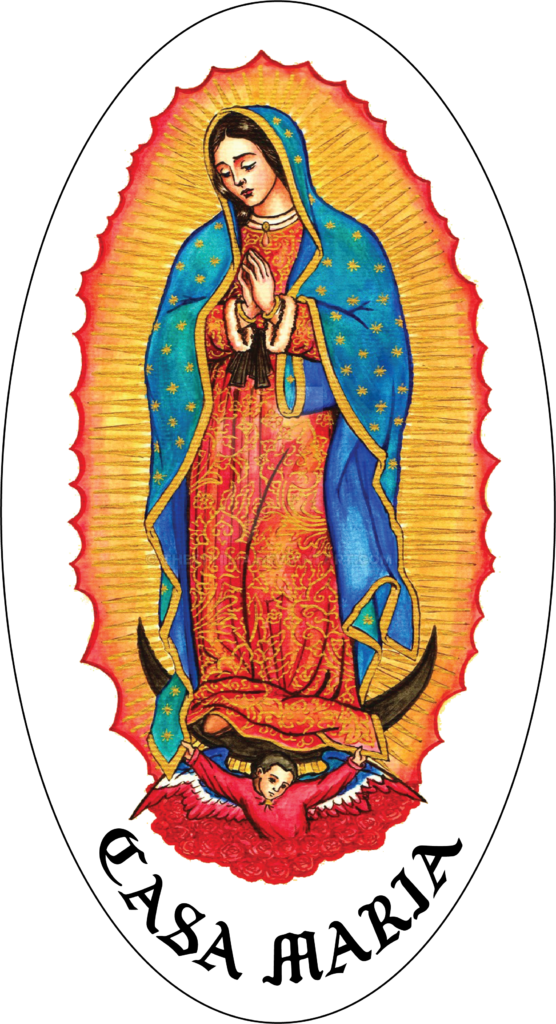Dr. Martin Luther King, Jr. remains one of the most prominent icons of American history. Since his death, he’s been canonized as the embodiment of justice and peace in the United States. He is taught in our schools as a leader of the Civil Rights movement and is celebrated every January with a national holiday in his name. Although this recognition is well deserved, it’s important to remember how King was actually treated while he was alive. As well as how he has been sanitized after his death to fit a national delusion of progress and “color-blindness” that works to depoliticize people who continue to struggle for many of the things he did. Dr. Martin Luther King represents much more than the “I Have Dream” slogan he’s been reduced to. He was never just a dreamer, but a fighter as well.
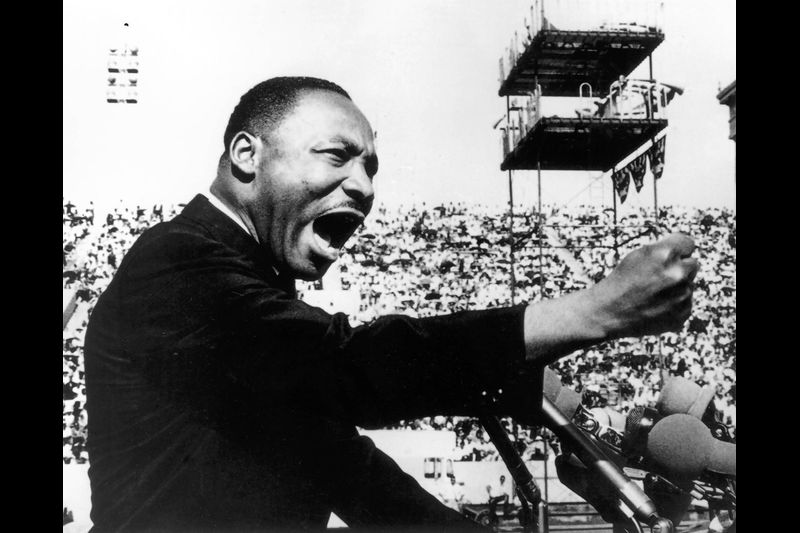
Throughout his lifetime, Dr. King struggled for workers’ rights and better housing conditions for Black and poor people, adamantly criticized the Vietnam war, and believed systemic change was necessary to reach racial and economic justice. He was consistently targeted by the FBI, was jailed, red-baited, and his family home was bombed by the Klu-Klux Klan. However, this didn’t stop him from continuing his work and building the connections between racism, war, and poverty in the United States. It was these specific actions and beliefs, along with his powerful ability to move people, that led to his assassination at the young age of 39. Up until that point, Martin Luther King, Jr. and others were organizing a poor people’s march to Washington, which demanded economic justice under the slogan “Jobs or Income Now!“, but King would not live to lead the march. The Civil Rights movement brought the Civil Rights Act and other important achievements, but poverty, unemployment, and even racism remain embedded in our society to this day. In order to truly honor King and be more like him, we must recognize and understand what he stood for and take action as he did. There is no time to wait. After being arrested and sent to jail in Birmingham, Alabama, (his 13 out of 29 arrests), he wrote the famous “Letter From Birmingham Jail” where he responded to critics who believed him impractical by saying:
“We know through painful experience that freedom is never voluntarily given by the oppressor; it must be demanded by the oppressed. Frankly, I have yet to engage in a direct action campaign that was “well timed” in the view of those who have not suffered unduly from the disease of segregation. For years now I have heard the word ‘Wait!’ It rings in the ear of every Negro with piercing familiarity. This ‘Wait’ has almost always meant ‘Never.’ We must come to see, what one of our distinguished jurists said, ‘Justice too long delayed is justice denied.”
The Three Evils: Racism, Materialism, Militarism
Reflecting on the life of Martin Luther King Jr., it’s evident that his leadership, commitment, and principles were a result of the social and economic context in which he was living. In the South, where he grew up, Jim Crowe laws reigned racist and fascistic terror on communities by preventing Black populations from voting, enforcing segregation, and instilling fear and control through violent lynchings and bombings. In the North, although racist attitudes weren’t as depraved, the increasing migration and urbanization of Black people also came with economic exploitation, extreme poverty, and slum conditions. This was also during a time when the United States was waging war overseas and Cold War rhetoric was fuming. Anyone’s critique of the system was seen as Anti-American and a threat to democracy. 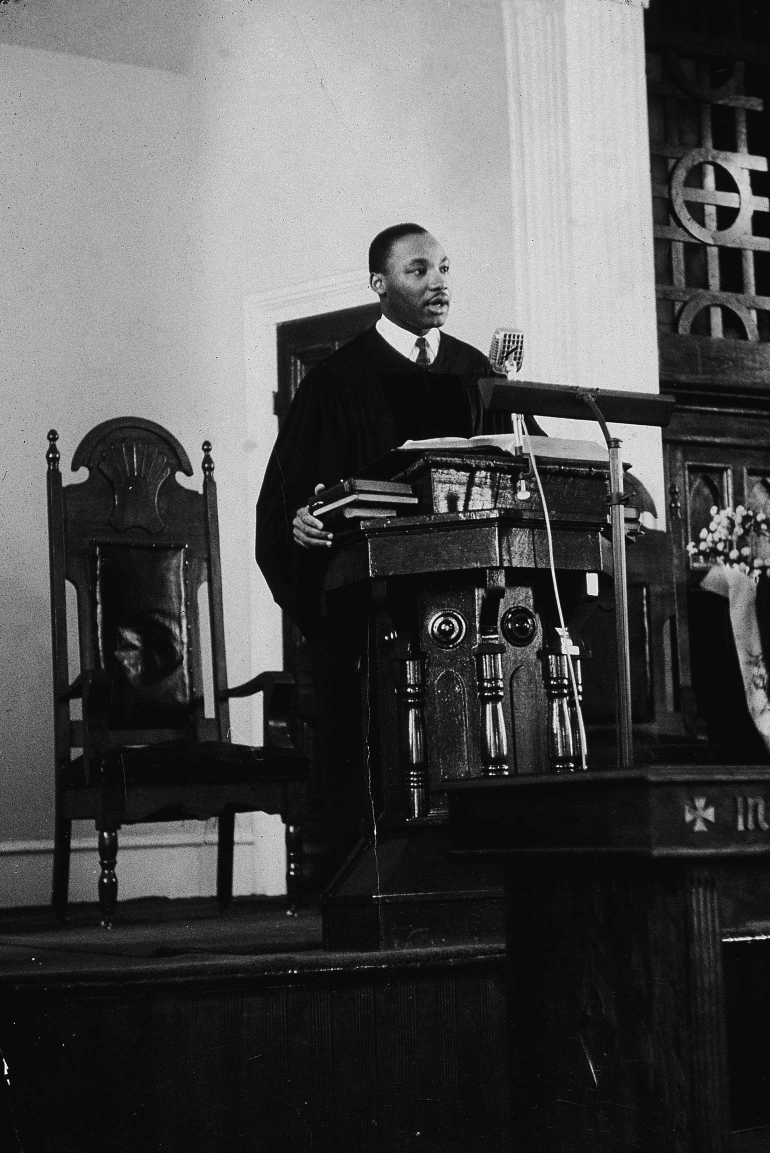
Through these struggles rose close-knit communities and the growth of independent institutions, such as the large urban churches where Dr. King and the other young pastors of the Southern Christian Leadership Council emerged. The rapidly growing movement used non-violent civil disobedience and the language of freedom to push for basic human rights, but this was received with a tremendous backlash. From his start leading the Montgomery Bus Boycott in 1955 at the age of 26 up until his death, MLK would be arrested multiple times, beaten, and his and his family’s life threatened. Yet, his critique of the system would only intensify, and he would continue organizing after the Civil Rights Act of 1966 as injustices within the country remained. In a report to SCLC Staff in 1967 King states:
“We have more from the era of civil rights to the era of human rights,, an era where we are called upon to raise certain basic questions about the whole society. We have been in a reform movement… But after Selma and the voting rights bill, we moved into a new era, which must be the era of revolution. We must recognize that we can’t solve our problem now until there is a radical redistribution of economic and political power… this means a revolution of values and other things. We must see now that the evils of racism, economic exploitation and militarism are all tied together… you can’t really get rid of one without getting rid of the others… the whole structure of American life must be changed. America is a hypocritical nation and [we] must put [our] own house in order.”
He called out the United States’ hypocrisy for its violent and unjust participation in the Vietnam War while claiming to be the beacon of democracy and liberty. He was also making the connection between war abroad and poverty at home; questioning the immense spending in wars, when those resources could be used to help people at home. This has extreme relevance today, as the United States continues to increase the military budget (Joe Biden just approved a $770 military spending bill with bipartisan support), while social programs are gutted and more and more people are being left in poverty.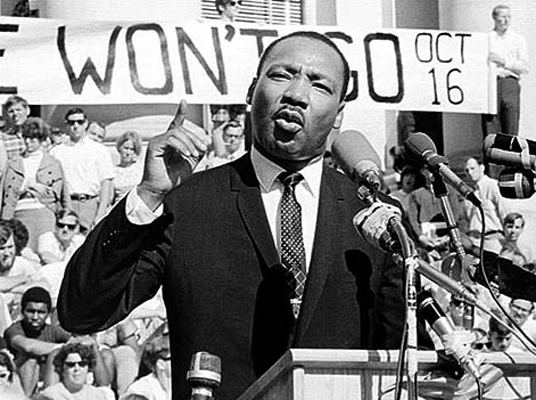
Chicago Freedom Movement and MLK’s Fight for Fair Housing
Between 1965 and 1967, MLK would help lead the Chicago open housing movement, or Chicago Freedom Movement, that sought to end institutionalized racism in housing and schools.
On Jan. 26, 1966, King moved into an apartment in Chicago’s West Side as a way to expose the slum conditions in which Black people lived. It was a time when discriminatory lending practices and neglectful landlords were the norms under the infamous reign of Mayor Richard S. Daley. People were being forced to pay an exorbitant amount of money for rat-infested homes that lacked heat and were in desperate need of other repairs.
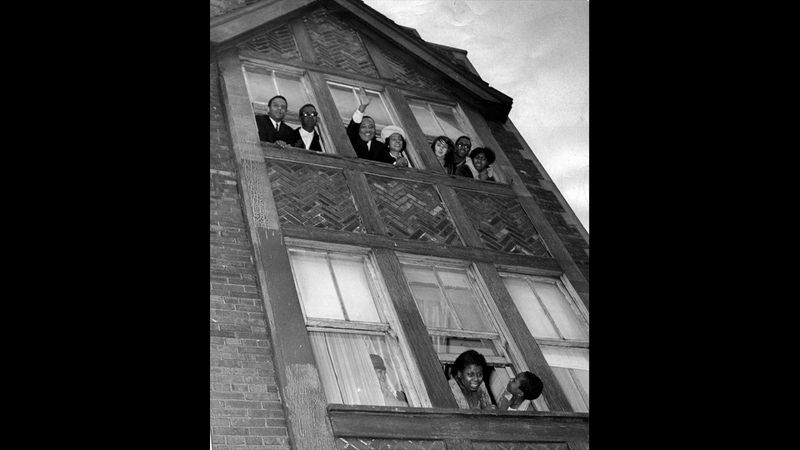 The movement would include rallies, protest marches, boycotts, and other forms of non-violent direct action led mostly through middle-class, white neighborhoods. The actions attracted violent white mobs holding signs that read “Join The White Rebellion” and “We Worked Hard For What We Got” and severe repression from police. After being hit by a rock and knocked to the ground at a demonstration in Marquette Park on the Southwest Side, Dr. King said “I have never seen, even in Mississippi and Alabama, mobs as hateful as I’ve seen here in Chicago.” This would reveal once again the reality of racism in the country as more than just a Southern phenomenon. Housing discrimination was happening all over the country, including Tucson.
The movement would include rallies, protest marches, boycotts, and other forms of non-violent direct action led mostly through middle-class, white neighborhoods. The actions attracted violent white mobs holding signs that read “Join The White Rebellion” and “We Worked Hard For What We Got” and severe repression from police. After being hit by a rock and knocked to the ground at a demonstration in Marquette Park on the Southwest Side, Dr. King said “I have never seen, even in Mississippi and Alabama, mobs as hateful as I’ve seen here in Chicago.” This would reveal once again the reality of racism in the country as more than just a Southern phenomenon. Housing discrimination was happening all over the country, including Tucson.
After a year of persistence, the movement was able to meet some demands, including forcing the Chicago Housing Authority to build public housing in white middle-class areas, and the Mortgage Bankers Association to stop its unfair lending policies. It would also inspire the Fair Housing Act of 1968, passed shortly after King’s death.
What Lessons Can We Learn From Dr. King?
Despite the progress of the Civil Rights era, a lot of issues MLK fought for during his lifetime still exist today. Poor housing conditions, slumlords, unfair lending practices, and lack of affordable housing are symptoms that dominate our current housing crisis. Just this month, 17 people, including 8 children, were killed in a fire in a 19-story apartment building in New York City. People were killed after a fire was caused by a malfunctioning space heater and security doors that failed to close, allowed thick smoke to rise through the tower. It was the deadliest blaze in NYC in over three decades. At the same time, a row home in Philadelphia, where over 27 people were living, caught on fire taking 8 lives. The smoke detectors of the apartment, owned by the Philadelphia Housing Authority, were inoperable at the time of the fire. Homelessness, rising rents, and deplorable housing conditions continue to run rampant, as housing and land are increasingly privatized. Multiple families are stuck living in overcrowded and decaying spaces. Affordable housing is non-existent as real estate giants dominate the “free market” and regular working-class people are priced out.
What Dr. Martin Luther King understood and a lesson we can learn from him today is that “there is nothing new about poverty” and “no deficit in human resources” inside the richest country in the world. We continue to spend billions to “spread democracy” to other countries, while poor and working-class people are left to fend for themselves amidst a never-ending pandemic. It’s not a matter of incompetence, lack of resources, or Democrats vs. Republicans. Despite having control of the House, Senate, and presidency, Democrats continue to break promises and inadequately address the COVID-19 pandemic. The Build Back Better plan, which was intended to relieve a lot of these issues, has been gradually stripped of funding, including billions in housing, and has failed to pass. Though Joe Manchin’s lack of support is seen as the main reason for this failure, it’s clear that the Democrats are not willing to do what it takes to fight for working people. However, an increase in military spending can be passed with ease and with support from both parties. It makes you question who actually runs the country if the president himself can be overpowered by a right-wing senator and the corporations that back him (it’s because Biden is also on the side of corporations).
Back in the 60s, Dr. Martin Luther King was raising these questions as well. In August 1967, he gave his last major speech to the Southern Christian Leadership Council, entitled, “Where Do We Go from Here?”. What he described rings true today:
“I want to say to you as I move to my conclusion, as we talk about ‘Where do we go from here,’ that we honestly face the fact that the movement must address itself to the question of restructuring the whole of American society. There are forty million poor people here. And one day we must ask the question, ‘Why are there forty million poor people in America?’ And when you begin to ask that question, you are raising questions about the economic system, about a broader distribution of wealth. When you ask that question, you begin to question the capitalistic economy. And I’m simply saying that more and more, we’ve got to begin to ask questions about the whole society. We are called upon to help the discouraged beggars in life’s market place. But one day we must come to see that an edifice which produces beggars needs restructuring. It means that questions must be raised. You see, my friends, when you deal with this, you begin to ask the question, ‘Who owns the oil?”‘You begin to ask the question, ‘Who owns the iron ore?’ You begin to ask the question, ‘Why is it that people have to pay water bills in a world that is two thirds water?’ These are questions that must be asked.”
Honoring Dr. King’s true legacy means continuing to agitate, organize, mobilize, and build a grassroots movement that opposes imperialist war abroad while fighting for social and economic justice at home. It means understanding the true source of poverty isn’t individual choices, but a structure of greed that keeps a strong divide between the ultra-rich and the poor. We should remember him as more than just a speaker at a rally, but as a man who was trying to make the connection between different forms of oppression, both nationally and internationally, as a single struggle against the foundation that breeds it all: the capitalist system.
